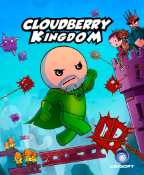Cloudberry Kingdom Review
|
|
See PixlBit's Review Policies

On 10/02/2013 at 12:00 PM by Nick DiMola Level designer > Random level generator |

Only for those intrigued by the random level generator who understand the limitations of the experience.
I wouldn’t blame you if you didn’t realize that Cloudberry Kingdom is entirely made up of randomly generated stages. They demand a level of precision and contain enough traps that you’d think some masochistic level designer was madly laughing as he put most of them together. Of course, this does speak volumes of the quality of the level generator that sits behind this intensely challenging 2D platformer, but without anything pulling everything together, it’s more of a never ending gauntlet of disparate levels than a game.
Depending on what you’re looking for, that could be positive or negative. Unquestionably, it’s a unique approach, but in my case, it didn’t take long for the experience to lose its luster. There is a story mode that attempts to bridge the gap between the levels and the unique instances of your character, but all that really means is that you’re occasionally treated to a claymation cutscene and the game takes over what types of random challenges you’re going to encounter. Essentially, you’re ceding control over what types of levels are created, as other modes give you the flexibility to customize all of the variables that generate the level before heading in.
What’s most interesting about Cloudberry Kingdom is the simple fact that the game can control very differently from a mechanics perspective, depending on which version of the main character, Bob, you are using. His base ability allows him to run and jump, but other variations of Bob have him double jumping, using a rocket pack, shrinking, jumping on a pogo stick, rolling on a wheel, and contending with increased gravity, among other abilities. All of these different instances of the character control well and the level generator still perfectly accommodates his changed abilities providing for the same brutal challenge found under his base moves.
As you play the game more, you start to realize that every level, though randomly generated has a very particular flow that’s required in order to make it through to the end. If you can manage to catch that flow, you’ll avoid the gratuitous lasers, the spikes jutting from the ground, and the spinning obstacles while managing to land and propel off each enemy placed in the level. Quite often, the coins placed throughout the level act as a guide to catching that flow and moving through with absolute precision.
Though I found Cloudberry Kingdom interesting only for a short while, it does have an indescribable ability to grab hold of your attention and elicit your desire to give every level one more try when you fail. Despite the fact that the experience is extremely shallow and nothing more than a quick jaunt from the left side of the screen to the right, you can end up in an inescapable loop where you can’t pull yourself away from the game.
I find Cloudberry Kingdom to be a very interesting experiment and a fun diversion at times, but it’s hardly a game as much as it’s a toy or a tool. I can appreciate the complexity behind their random level generator, as well as the challenge issued by these brutal level arrangements, but it simply lacks staying power. My best suggestion is to grab Cloudberry Kingdom during a sale only if you’re a platformer junky. Otherwise, players are much better off buying a game that’s been crafted by a designer with a trained eye. The talented ones know how to imbue a game world with the right amount of variety to keep the experience interesting.











Comments